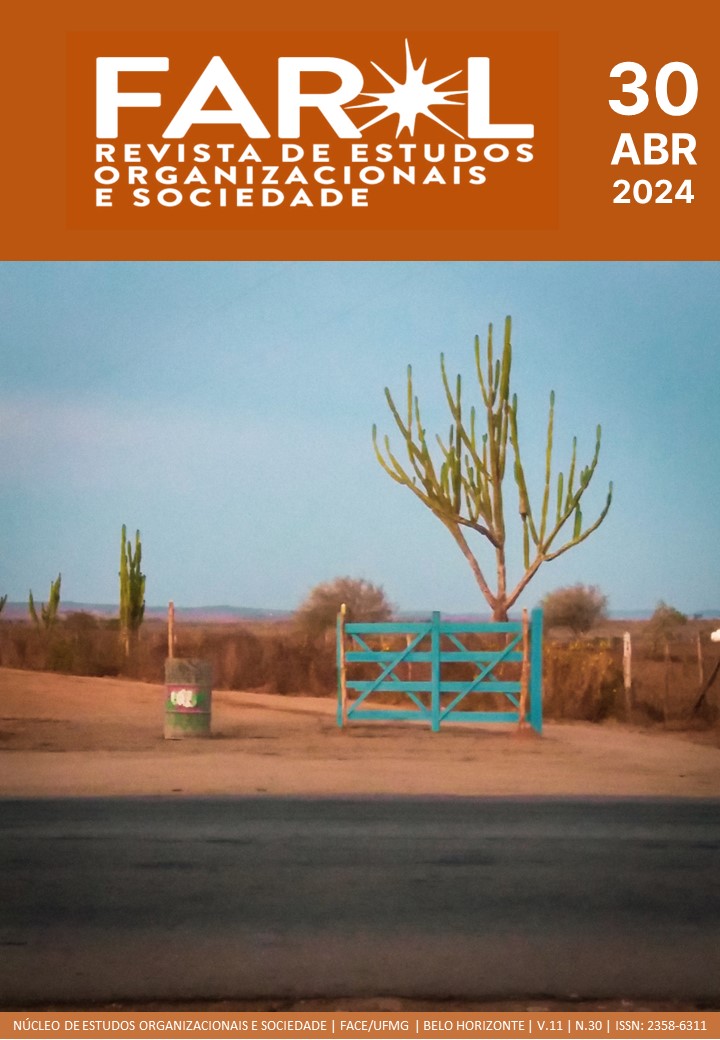“ANIMALS CAN HELP US BUILD A FAIRER ORGANIZATIONAL WORLD, DISRUPT ANTHROPOCENTRISM”: INTERVIEW WITH VERÓNICA POLICARPO
DOI:
https://doi.org/10.25113/farol.v11i30.8005Keywords:
Human-animal studies, Estudos multiespécies, animais, organizaçõesAbstract
We, the editors of the special dossier "Animals and Organizations", invited Professor Verónica Policarpo for this interview to our thematic dossier. Professor Policarpo is a sociologist and the founder and coordinator of the Human-Animal Studies Hub at the University of Lisbon. Our goal was to introduce our readers to the field of Human-Animal Studies and to explore the possibilities of intersection with Organizational Studies. Our interview took place at Professor Policarpo's home, where we were joined by two cats, Coco and Mostarda. Our conversation started in person and continued over a few days through audio files. We discussed a variety of subjects, including the relationship between personal experiences and animal research, activism, the formation of research networks, the development of the field of Human-Animal Studies in the Portuguese-speaking world and beyond, its political and institutional constitution, methodologies, challenges, agendas, and possible connections with management and organizational studies.
References
Adams, Carol J. (2012). A política sexual da carne: A relação entre carnivorismo e a dominância masculina. São Paulo: Alaúde.
Adams, Carol J. & Donovan, Josephine (1995). Animals and women: feminist theoretical explorations. Durham: Duke University Press.
Agamben, Giorgio (2013). O aberto: o homem e o animal. Rio de Janeiro: Civilização Brasileira.
Araújo, Fernando (2003). A hora dos direitos dos animais. Lisboa: Universidade de Lisboa.
Arluke, Arnold & Sanders, Clinton R. (Eds.) (1996). Regarding animals. Philadelphia: Temple University Press.
Chao, Sophie, Bolender, Karin, & Kirksey, Eben (2022). The promise of multispecies justice. Durham: Duke University Press.
De Fontenay, Elisabeth (2014). Le silence des bêtes: la philosophie à l’épreuve de l’animalité. Paris: Fayard.
Deleuze, Gilles (2000). Mil platôs: capitalismo e esquizofrenia. São Paulo: 34.
Demello, Margo (2012). Animals and society: an introduction to human-animal studies. New York: Columbia University Press.
Derrida, Jacques (1999). O animal que logo sou (a seguir). São Paulo: Unesp.
Despret, Vinciane (2021a). Que diriam os animais? São Paulo: Ubu.
Despret, Vinciane. (2021b). The dance of the Arabian babbler: birth of an ethological theory. Minneapolis: University of Minnesota Press.
Despret, Vinciane (2004). The body we care for: figures of anthropo-zoo-genesis. Body and Society, 10(2–3), 111–134.
Hamilton, Lindsay & Taylor, Nik (2017). Ethnography after humanism: power, politics and method in multi-species research. London: Palgrave Macmillan.
Haraway, Donna J. (2022). Quando as espécies se encontram. São Paulo: Ubu.
Haraway, Donna J. (2021). O manifesto das espécies companheiras – cachorros, pessoas e alteridade significativa. Rio de Janeiro: Bazar do Tempo.
Haraway, Donna J. (2016). Staying with the trouble: making kin in the Chthulucene. Durham: Duke University Press.
Haraway, Donna J. (1989). Primate visions: gender, race, and nature in the world of modern science. London: Routledge.
Harrison, Ruth (2013). Animal machines. Wallingford: Cabi Publishing.
Ingold, Tim (1994). What is an animal? London: Routledge.
Kirksey, Eben (Ed.) (2014). The multispecies salon. Durham: Duke University Press.
Kuhn, Thomas (1997). A estrutura das revoluções científicas. São Paulo: Perspectiva.
Latour, Bruno (2012). Reagregando o social: uma introdução à Teoria do Ator-Rede. Salvador/Caxias do Sul: EDUFBA/EDUSC.
Lestel, Dominique (1996). L’animalité: Essai sur le statut de l’humain. Paris: Hatier.
Policarpo, Verónica (2022). Perder um animal de companhia: rituais e práticas sociais de luto. Análise Social, LVII(2), 406-425.
Policarpo, Verónica & Tereno, Henrique (2022). Precisar, sonhar, “inesperar”: animais de companhia e comunidades pessoais multiespécies. Análise Social, LVII(2), 340-366.
Regan, Tom (2004). The case for animal rights. Berkely: University of California Press.
Ryder, Richard (1975). Victims of science: the use of animals in research. London: Davis-Poynter.
Serpell, James (1996). In the company of animals: a study of human-animal relationships. Cambridge: Cambridge University Press.
Singer, Peter (2010). Libertação animal. São Paulo: Martins Fontes.
Thomas, Keith (1991). Man and the natural world: changing attitudes in England 1500-1800. Oxford: Osford University Press.
Tsing, Anna, Deger, Jennifer, Saxena, Alder Keleman, & Zhou, Feifei (2020). Feral atlas: the more-than-human Anthropocene. Redwood City: Stanford University Press.
Tuan, Yi-Fu (2003). Dominance and affection: the making of pets. New Haven: Yale University Press.
Van Dooren, Thom (2022). A world in a shell: snail stories for a time of extinctions. Cambridge: MIT Press.
Van Dooren, Thom (2019). The wake of crows: living and dying in shared worlds. New York: Columbia University Press.
Wolch, Jennifer R., & Emel, Jody (1998). Animal geographies: place, politics, and identity in the nature-culture borderlands. London: Verso books.
Downloads
Published
Issue
Section
License
Copyright (c) 2024 Verónica Policarpo, Letícia Dias Fantinel

This work is licensed under a Creative Commons Attribution 4.0 International License.
Assume-se que em qualquer das modalidades de contribuições aceitas pela Farol – Revista de Estudos Organizacionais e Sociedade, ao submeter um trabalho, o(s) autor(es) se reconhece(m) como detentor(es) do direito autoral sobre ele e autoriza(m) seu livre uso pelos leitores, podendo ser, além de lido, baixado, copiado, distribuído, adaptado e impresso, desde que seja atribuído o devido crédito pela criação original. Em caso de aprovação do trabalho para publicação, os direitos autorais (inclusive os direitos de tradução) são exclusivamente do(s) autor(es).
Os autores devem concordar com os seguintes termos relativos aos Direitos Autorais:
a. Autores mantém os direitos autorais e concedem à revista o direito de primeira publicação, com o trabalho simultaneamente licenciado sob a Licença Creative Commons Attribution que permite o compartilhamento do trabalho com reconhecimento da autoria e publicação inicial nesta revista.
b. Autores têm autorização para assumir contratos adicionais separadamente, para distribuição não-exclusiva da versão do trabalho publicada nesta revista (ex.: publicar em repositório institucional ou como capítulo de livro), com reconhecimento de autoria e publicação inicial nesta revista.
c. Autores têm permissão e são estimulados a publicar e distribuir seu trabalho online (ex.: em repositórios institucionais ou na sua página pessoal) a qualquer ponto antes ou durante o processo editorial, já que isso pode gerar alterações produtivas, bem como aumentar o impacto e a citação do trabalho publicado (Veja O Efeito do Acesso Livre).

